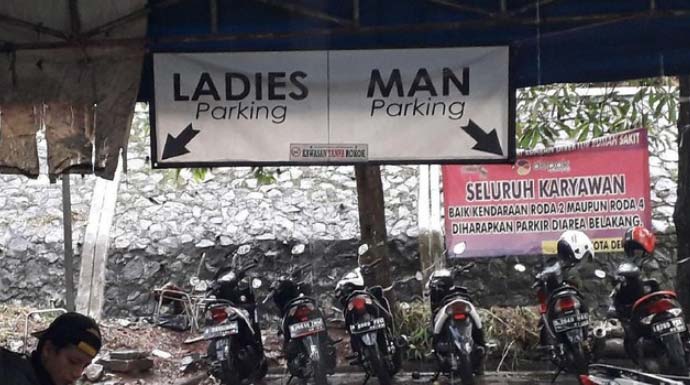Many public spaces in Indonesia, particularly malls, already provide special parking spaces for women, often connoted with pink “ladies parking” signs and situated closest to the building’s entrance. While such a policy has had its share of praise and criticisms over the years, the city administration of Depok has been in the news recently for taking the idea further by introducing a policy that segregates parking spaces by gender.
The Depok city administration recently announced the policy, which has already been enforced in government buildings like City Hall, Depok General Hospital, as well as shopping centers like Margocity and Depok Town Square.
When asked about the policy, a city official said it was introduced to bring gender equality in Depok.
“This segregation is to give space to women and to make it easier for women to park their vehicles. This is a program to empower women,” Depok Transportation Agency Head Dadang Wihana told Viva yesterday.
The policy applies to both motorcycle and car parking. However, Dadang pointed out that the policy is more of a “suggestion” rather than a mandate, as there are no sanctions for parking lot operators if they don’t adopt the policy.
But the policy has drawn outrage online, with many netizens not buying the gender equality argument and suggesting that it was a sign that the city was pushing religious conservatism by separating sexes.
Hebat benar Pemkot Depok sampai urusan parkir mau disyariahin.
Kenapa nga urusin yg lebih substansial? Sampai kapan agama hanya dijadikan bahan lelucon?
— Patar Panggabean (@PatarPanggabea7) July 9, 2019
“It’s incredible that the Depok city administration is implementing sharia (values) down to parking. Why not focus on more substantial matters? For how long does religion have to be a source for jokes?” the tweet above reads.
Normalizing gender inequality.
Special parking spots for women, which are common in Indonesia, have long been criticized for giving credence to the stereotype that women are inferior drivers to men. Similarly, other long-standing policies like women-only carriages on trains and women-only sections on buses have been criticized for being myopic solutions to sexual harassment in public facilities, when the real solution lies in educating people not to sexually harass others.
Supporters of such policies say they are necessary to protect women from dangers that can lurk in public spaces.
Similar gender segregation policies have gone viral in Indonesia in recent weeks, such as a school in Jakarta separating stairs for boys and girls. One particular policy in East Java, which segregates a beach by gender, has been accused of being emblematic of a larger movement towards “Arabization” in Indonesia.





Reader Interactions